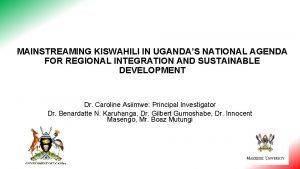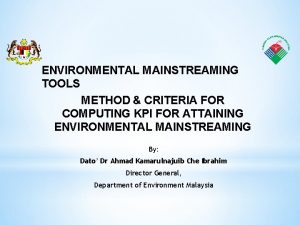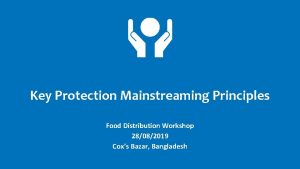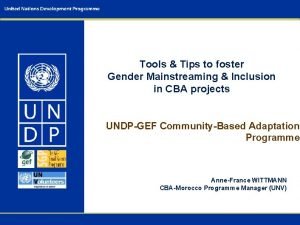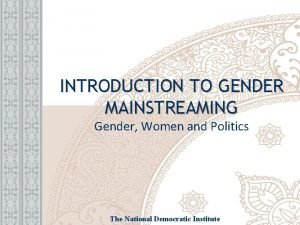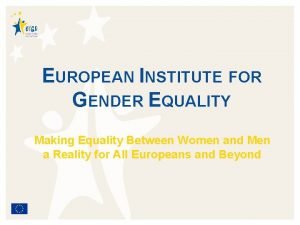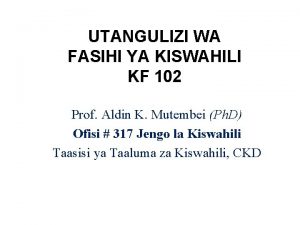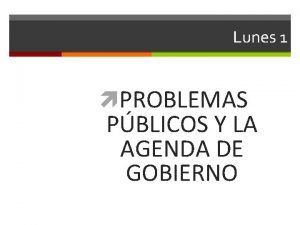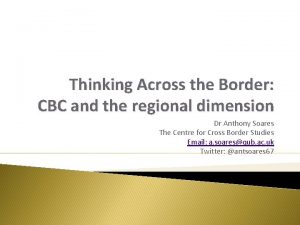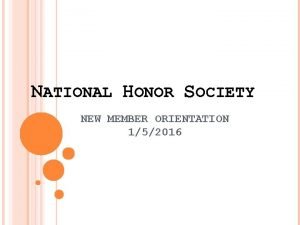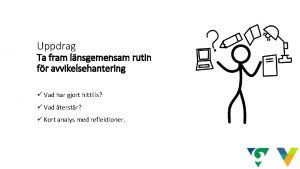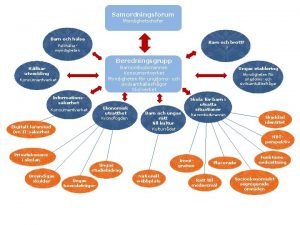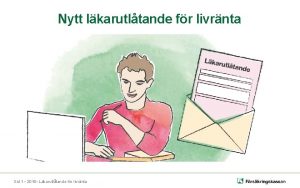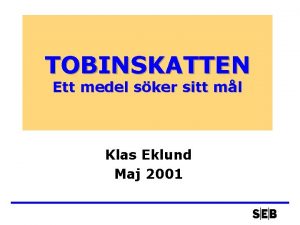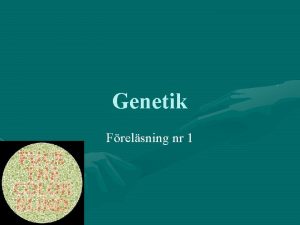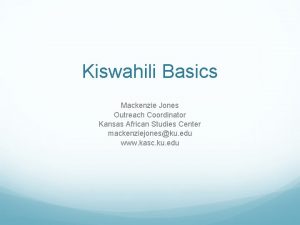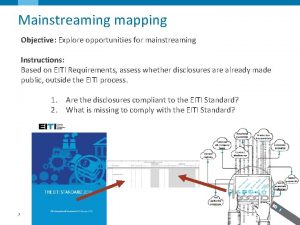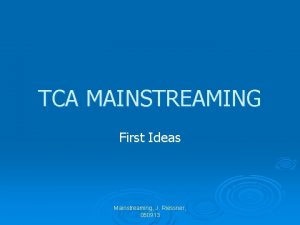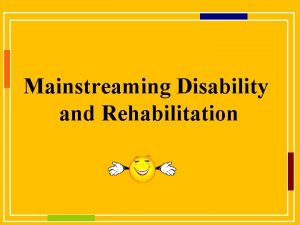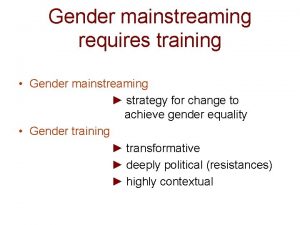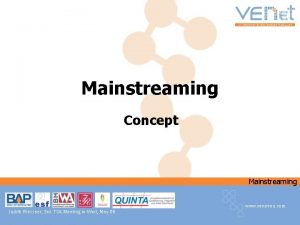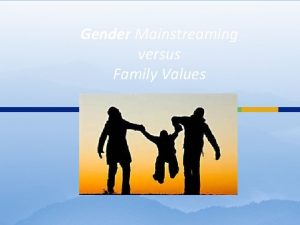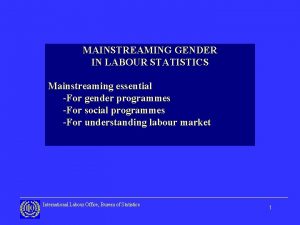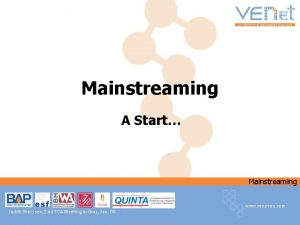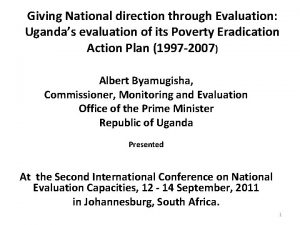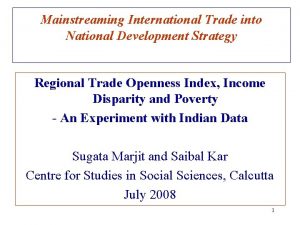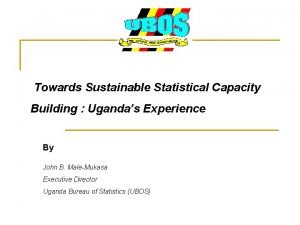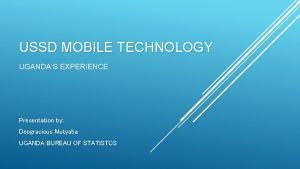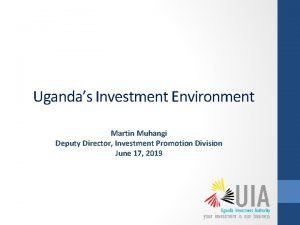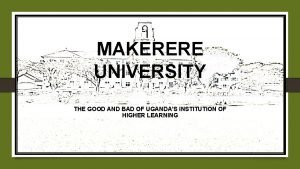MAINSTREAMING KISWAHILI IN UGANDAS NATIONAL AGENDA FOR REGIONAL

























- Slides: 25

MAINSTREAMING KISWAHILI IN UGANDA’S NATIONAL AGENDA FOR REGIONAL INTEGRATION AND SUSTAINABLE DEVELOPMENT Dr. Caroline Asiimwe: Principal Investigator Dr. Benardatte N. Karuhanga, Dr. Gilbert Gumoshabe, Dr. Innocent Masengo, Mr. Boaz Mutungi

Presentation Outline q. Introduction q. Language, National Agenda, Regional Integration and Sustainable Development q. What is Mainstreaming Kiswahili? q. Study Methodology q. Findings • Why mainstream Kiswahili? (opportunities/why Ugandans need Kiswahili) • Challenges/constraints to mainstreaming Kiswahili (why Kiswahili is not popular, challenges, who should promote it) • How should Kiswahili be mainstreamed? (How to popularize it/ best ways of promoting) q. Conclusion and Recommendations

Introduction q. Language Question in Africa since colonial times has raised controversial debates on language choice, development and use q. Language and development always framed on policy and practice, arguing on which languages should be developed q. The issues at hand have been the power, role and status of various languages found in Africa: foreign or indigenous, and whether official or not. q. Uganda is one area where the language issue has been debated on for long q Kiswahili language has been accorded legal status at both national and regional levels but its place still remains emotive and sensitive q. This study thus aimed at discussing how mainstreaming Kiswahili in Uganda’s national Agenda can hasten and strategically position the country for integration and engender sustainable development.

National Agenda, Regional Integration and Sustainable Development q. Uganda’s Vision 2040 q. Regional integration q. There are various forces of integration, African nations have to integrate for stronger bargaining power q. Though traditionally integration has been based on economic and political aspects, there is need for a holistic approach- integrate the cultural issues. q. Language is part of culture and it enhances communication q. Strategic communication through a language of wider communication enables citizens to participate in the integration process q. Uganda and the EAC bloc recognize Kiswahili as the regional language of wider communication

The Kiswahili Language Question in Uganda q. It is the perennial and stubborn question of defining the place and role of Kiswahili in Uganda q. Attitude towards Kiswahili: Citizens and authorities q. Arab trade and the spread of Kiswahili in Uganda (Initially Kiswahili was a trade language before being used for administration and religion) q. During British colonialism, Kiswahili use expanded into Education and Military and Police use q. So the Kiswahili Language Question in Uganda is about its development and use in domains such as: Business and Trade; Politics and Administration; Religion; Education; Media; Police and Military; Health; Creative Industries (eg. Music); Parliament; Criminal Justice System (Courts, Prisons, etc)etc q. KLQ is about deliberate efforts by precolonial; colonial and post-colonial authorities in Uganda to develop and deploy language

The Kiswahili Language Qn… q. KLQ is about development at Local; National; Regional; Pan-African and Global affairs q. Kiswahili Language Policy in Uganda q. Status of Kiswahili: Official Language or National Language q. Approaches to Kiswahili Language Planning in Uganda q. Multilingualism and the place of Kiswahili q. KLQ in Uganda remains complex, elusive and highly emotive q. Establish nexus between Theory = Policy=Practice of Kiswahili in Uganda q. The value of Kiswahili as: Communication Tool; Strategic Resource; Identity Marker q. Kiswahili Language Plan of Action: Towards Kiswahili Renaissance in Uganda (Renewed interest)

Language, National Agenda, Regional integration and Sustainable Development (SD) q. The vision of the country needs to be communicated to the citizens. q. Language is a communication tool / powerful means to disseminate knowledge & ideas that can aid Social Transformations. q. Language enables the citizens share to experiences and meaning as individuals and the community. q. Language is part of culture with values which are embedded in our societies as powerful resources with large human and social costs when lost q Language is the key element of communication. Since there is no development without communication, we can state that language has a particularly important function in the achievement of SD.

Language and SD q. Sustainable Development can be defined as the structured principles that have been conceived to meet the expectations of human development. q. The need for a holistic approach to development -embraces shared cultural values q. The citizens need knowledge on SD. q Language can be used by government to achieve SDGs by affecting the behavior of citizens. q. People must understand why they have to be patriotic q. This can only be done through strategic communication. Kiswahili as a lang. of Wider communication will enable the citizens to participate in regional development issues

Language and SD Cont’d q. There is need for Development Support Communication (DSC) in Uganda q. The national development Agenda can’t be realized without development communication; Development communication can not be there with out a language that leads to strategic communication q. Language links planners, implementers and policy makers; it is that link that makes people understand what development is all about. q. Should be a language of wider communication q. Hence, the need for mainstreaming Kiswahili

Mainstreaming Kiswahili in EAC Agenda for Regional Integration and Sustainable Development. q. What is Mainstreaming Kiswahili? q. In this context, Mainstreaming Kiswahili is the process of integrating and incorporating language issues at all levels by stakeholders involved in planning, implementation and policy making in various Kiswahili domains.

Study Methodology q. Study done in 2 Districts Kampala and Mbarara after a pilot study in Jinja and Wakiso q. The study Population 500 respondents q. Key informant interviews, Focus Group Discussions, Questionnaires q Entities; • Creative Arts, Education • Law and Policy Makers, Publishing • Cultural Institutions, Governance, • Judiciary, Health, • Religious institutions, Media • Armed forces, Business Sector

Why Mainstream Kiswahili? q. Article 137 of EAC Treaty recognizes Kiswahili as language of wider communication q. The 2007 EAC Heads of States Summit established the East African Kiswahili Commission (EACK) and Uganda signed this protocol for Development and Use of Kiswahili q 2016 EALA passed a resolution to make Kiswahili an official language q 2017 Council of Ministers directed Partner States to institutionalize its use q. Article 6 (2) of the Constitution of Uganda provides that “Kiswahili shall be the second official language in Uganda to be used in such circumstances as Parliament may by law prescribe”. q And in 2019, the Cabinet of Uganda approved the principles for the establishment of the National Kiswahili Council to fulfill government obligation as an EAC Partner State and also to operationalize article 6(2) of the Constitution.

Why mainstream Kiswahili cont’d Reasons as to why Ugandans need to learn Kiswahili 7% 7% 1% 1% 27% Easy Communication Improved business 9% Regional Integration Unity widely spoken in EAC Employment and Mobility 13% 23% 14% Pan African &Intenational language Used by Army &Police Others

Challenges/constraints to mainstreaming Kiswahili q Kiswahili was introduced in Tz, Ke and Ug around the same period but Uganda lags far behind in the use &development of the regional common language q Estimates of 2002: 20% of Ugandans can comprehend Kiswahili. 49% of respondents for the current research said they can speak some Kiswahili. The % of Kiswahili speakers in Ke and Tz is above 90% q The infamous joke: Kiswahili was born in Zanzibar, grew up in Tanzania, fell sick in Kenya, died in Uganda and was buried in Congo!

Challenges… q. Notwithstanding this joke (fact? ), the Uganda constitution names Kiswahili as the 2 nd OL; while the EAC treaty requires all partner states to prioritize the popularization of the Kiswahili; and also a language of wider commn in E&C. Africa. . . q In the same connection, 97% of the respondents supported the necessity to develop Kiswahili in Ug q Conversely, despite such support, the popularity of Kiswahili is (still) quite low in Uganda (i. e. at 29%). What then is hampering the popularity and promotion of Kiswahili in Uganda?


The Major Challenges Explained

Challenges…. Ø A language of the military/security forces Ø A commanding and violent language q Multilingual related factors which lead to lack of interest in Kiswahili: ØExistence of English as an official language ØUse of English as an international language ØPassion for local languages: Kisw as a ‘killer lg’(? ) q Limited government commitment regarding: ØLanguage planning ØLanguage policy

Challenges…. . Ø Policy implementation agencies: boards, societies… Ø Central popularization, status development & coordination agency (Ref. KAKAMA, BAKITA, CHAKITA, PANSALB, and [‘BAKIU’? ]) q Others challenges: Ø Politicization of Kiswahili Ø Low levels of education Ø Limited Kiswahili literature Ø It’s difficult to learn Ø Not spoken by many people

Challenges…. Ø There is no doubt that the promotion, development and use of Kiswahili in Uganda has stagnated for a long time. Ø Nevertheless, the challenges to such promotion use and development are not insurmountable. Ø Apparently, there is a glimpse of light at the end of the long tunnel, as this research suggests.

How should Kiswahili be mainstreamed? Strategies for mainstreaming/popularizing Kiswahili q. Make the language compulsory and examinable in primary and secondary schools by policy q. Make Kiswahili a prerequisite formal employment and elective positions q. Develop and avail free or affordable self-teaching resources q. Provide incentives for learning and use of Kiswahili e. g. scholarships and awards. q. Undertake a Kiswahili public awareness campaign through media. q. Integrate Kiswahili in formal/public activities. q. Start Kiswahili adult literacy centers across the country

How should Kiswahili be Mainstreamed? q. Establishment of the Kiswahili council q. Providing financial, legal and human resources q. Development of Kiswahili language policies q. Implementing policies through various programs and projects and these can be in different areas: ü Education: University- Teaching, Research, Publication/dissemination Secondary and Primary : Teaching Examination, teachers, Kiswahili as a curriculum subject üMedia: TV, Radio, Newspapers, Social, Media üPolitics and administration: meetings, sensitization üReligion ü Governance, Parliament (enact laws and regulations on Kiswahili, conflict management, elections etc

Beyond Mainstreaming Cont’d • Need for Publication and wider dissemination of research findings (For advocacy; awareness raising; Lobbying) • Need for curriculum review and reform on the teaching and learning of Kiswahili language • Identifying innovative pedagogies in the language to be used in SDGs education at various education levels. • Establish a Council to design Kiswahili policies • To establish Associations to implement Kiswahili policies.

6. Conclusion and Recommendations • Language is an important factor in national, regional integration and sustainable development; • Kiswahili has the capacity to make breakthroughs on all the development programs, SDGs, helping contribute to transforming lives of all citizens; • Properly managed, Kiswahili can be an important enabler and driver for dialogue, reconciliation, tolerance and peace aspects necessary for SD; • Structured engagement with key stakeholders in decisive ways will enhance the place and position of Kiswahili in EAC.

Recommendations • The government of Uganda should develop a clear Kiswahili language policy; • The government should mainstream Kiswahili in various domains of language use; • The Government of Uganda should develop an action plan for the Development and use of Kiswahili in its National Development Agenda; • Policy formulation on Kiswahili language in Education needs to be enacted to make Kiswahili compulsory in schools. Strategic measures need to be put in place in reference to the language in education policy, national and regional plans and sustainable development. • Key stakeholders in Regional Integration and academics to engage in structured conversation on the role of Kiswahili in integration and development • Need to use Kiswahili to demonstrate the missing link between theory, policy and practice in the role of language in national development integration and SD
 Mainstreaming in swahili
Mainstreaming in swahili Ercmc organization chart
Ercmc organization chart Protection mainstreaming principles
Protection mainstreaming principles Sex videao
Sex videao What is gender mainstreaming?
What is gender mainstreaming? Gender mainstreaming
Gender mainstreaming What is gender mainstreaming?
What is gender mainstreaming? Maana ya fasihi ya kiswahili pdf
Maana ya fasihi ya kiswahili pdf Agenda sistemica y agenda institucional
Agenda sistemica y agenda institucional National vs regional
National vs regional Uae vision 2021 education
Uae vision 2021 education National honor society meeting agenda
National honor society meeting agenda Cohesive society and preserved identity
Cohesive society and preserved identity Tack för att ni har lyssnat
Tack för att ni har lyssnat Rutin för avvikelsehantering
Rutin för avvikelsehantering Myndigheten för delaktighet
Myndigheten för delaktighet Läkarutlåtande för livränta
Läkarutlåtande för livränta Formuö
Formuö Treserva lathund
Treserva lathund Tack för att ni lyssnade
Tack för att ni lyssnade Debattinlägg mall
Debattinlägg mall En lathund för arbete med kontinuitetshantering
En lathund för arbete med kontinuitetshantering Tobinskatten för och nackdelar
Tobinskatten för och nackdelar Tack för att ni har lyssnat
Tack för att ni har lyssnat Biologiska arvet
Biologiska arvet Verifikationsplan
Verifikationsplan
